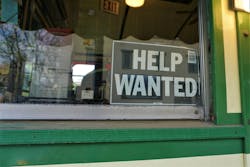Individuals changing careers offers a new talent pool for collision repair shops
Former homebuilder and youth minister Brad Fancher is not the type to jump off the deep end.
“I don’t normally try something unless I’m sure I’ll succeed at it," Fancher said.
As much as Justin Stokes believes “life is about progression and going for higher goals,” it was easy to be complacent with his customer service job for a decade even though he’d hit a dead end. Yet, both men took a huge risk, partly to better provide for their families, partly because something was missing.
“I made solid choices in my life, but there I was, asking myself, ‘What else can I accomplish?’” said Fancher.
To the surprise of both, they found what they were looking for in the collision repair field. Their stories suggest that career changers represent another pool of talent the collision repair industry can recruit, even if it’s not the first place it looks. As long as there are jobholders who believe there’s something better out there, there will be career changers.
Will they discover the opportunities offered by collision repair? Will collision repair employers discover them?
Just a few years ago, neither Stokes nor Fancher could have imagined they’d be self-employed as independent auto claims adjusters (IAs), especially since the extent of their auto expertise was checking the air in the tires. Stokes opened Stokes Family Appraisals and More LLC in Orange County, Calif, in Feb. 2021. Fancher has been building his business, Allen Adjusting, in the western Kentucky market since 2018. Both are busy performing auto damage estimates for a number of insurance companies. Their success is built on good working relationships with body shops and the trust of the insurers who hire them.
An accidental start leads to google searches, a life-changing book, and training
To leave one profession and enter another, there’s often some random events at play, a tolerance for risk-taking, and a lucky break often in the form of a mentor. While both Fancher and Stokes did their homework, it was pure chance that first opened their eyes to their new career. Their journeys had common elements of training, mentors, Chris Stanley’s “Independent Adjuster’s Playbook,” I-CAR Platinum, and lots of anxiety and hard work.
A common instigator for a career change is an opportunity in a new field presented by a colleague. Fancher’s friend, a catastrophe adjuster (CAT), asked for help with a week’s worth of hail damage claims. Fancher, who grew up in the construction business and had built spec homes for a living, had the right knowledge.
“It was a long time since I had to learn something new," said Fancher. "It was exciting.”
Later when Fancher discovered Stanley’s IA book, he pivoted into auto damage claims. It would not take him away from family for extended periods like CAT work and permitted him to continue his youth ministry work.
Stokes’ entry in the field on the other hand was literally an accident. A visitor to Stokes’ home backed into his neighbor’s car, and the neighbor asked Stokes to set up a damage estimate. Stokes googled information on estimates and saw salary information for adjusters. He immediately researched training options.
“The next day I talked to Charlie Robertson at Cerritos College and asked if they had I-CAR training," Stokes said.
Stokes was on his way, eventually working as a shop estimator for several years. Recently, unable to land a job as an APDA with an insurer, he discovered Stanley’s IA book. Taking his future in his own hands, he "followed Chris Stanley’s book to a tee” and opened his IA business.
Make it or break it moments and mentors
The career changer who chooses collision repair makes a much different emotional and financial investment than a youth entering a school collision repair program to try it out. For Fancher and Stokes, there was no room for error. With families to support, investments in training, computer equipment, a cell phone with a high-quality camera, estimating software, and other tools had to pay off.
“I love it – now, but after about three months into it, I almost packed up and threw in the towel," says Fancher.
Similarly, Stokes had doubts and fear.
“I went through a whole whirlwind of emotions. Here I knew nothing about cars, and I was going to assume a position where I had to be a car expert.”
Both men got through “make it or break it moments” with help from mentors. While at Cerritos, Stokes hit a wall looking for his first estimating job. He says body shops hesitate to invest in people who are "green". Working his customer service job during the day and attending school at night, Stokes wondered if he’d made a mistake. He talked to his teacher (Robertson), who encouraged him to apply to the paid apprenticeship program he founded, Collision Career Institute (CCI). Being dually enrolled in Cerritos and CCI was exactly the break Stokes needed.
Advice to career changers and employers
Stokes and Fancher have different lives today.
“I can’t believe I get to do this,” Fancher says. “I can’t wait to get to work each day.”
Training opened the door to a new career, and Stokes and Fancher expect to continuously train and maintain I-CAR Platinum (Fancher in the Auto Physical Damage Adjustor role, Stokes in the Estimator role), which their customers demand. Stokes plans to next take I-CAR vehicle-specific training, including Honda courses, while Fancher plans to learn about electric vehicles, a technology many area shops are inexperienced in.
To those who wonder if they could handle the pressure of changing careers, Stokes quotes a saying cited by Dave Luehr, “Feel the fear, and do it anyway” (“The Secrets of America’s Greatest Body Shops”). To employers inclined to turn away inexperienced newcomers who have put a lot on the line to prepare for a field they’re excited to join, Stokes says, “Look at that person as a potential investment in your company who’s coming with a positive attitude and is coachable, who you can teach to do things your way. That person may mesh better with your team than a person with experience.”
About the Author

Val D'Anna
Val D’Anna joined the segment support department of I-CAR in 2016, supporting technical school educators, and in 2019 assumed marketing responsibilities including social media, blogs, and other customer communications. She has more than 40 years writing experience in corporate communications, trade magazine publishing, and newspaper advertising. She holds a Bachelor of Journalism degree from the University of Missouri, where she majored in magazine.
